Published: Monday 21 October 2024 | No Comments
Grouped under: For Professionals
This resource is kindly funded by Churchill Fellow
This short video for deaf workers, with top tips for communication support at work, including:
- How to find and book interpreters
- Other kinds of support available
- Technology support at work
Access to Work can help pay for communication support costs at work. If you need more information on Access to Work, see our ‘Access to Work’ video.
How to find and book interpreters
If you had interpreters booked for you at school/university, booking your own interpreter may be a new experience.
Here are some top tips for finding, booking and keeping interpreters:
Where to find an interpreter
You can find registered sign language interpreters on the National Registers of Communication Professionals working with Deaf and Deafblind People (NRCPD) website. There are two types of BSL/English interpreter:
1. Registered Sign Language Interpreters (RSLI): these have completed a recognised interpreter training course. They have been assessed as safe to practice. They are held accountable via a complaints procedure. They will have a yellow official ID badge. They should wear this when they attend an event as an official interpreter.
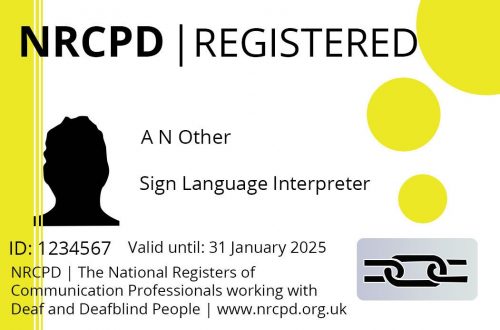
2. Trainee interpreters (TSLIs): these are currently completing a recognised interpreter training course. They are also regulated by NRCPD and can be booked for appropriate assignments. They will have a blue official ID badge. They should wear this when they attend an event as an official interpreter.
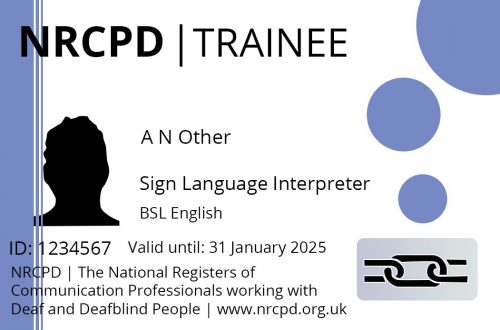
Information about interpreter fees can be found online at the National Union of British Sign Language Interpreters (NUBSLI). Interpreters generally charge either by half or full day.
Another way of finding BSL interpreters is to ask deaf friends for people they recommend.
You can also speak to an agency who will help you arrange a suitable interpreter.
If you already know an interpreter and they are not available, you can ask them to share information about work with their network. This can be particularly useful for short notice bookings.
Finding an interpreter is in part a personal choice. For example, you may prefer to have a certain kind of rapport with your interpreter.
Over time you may choose to keep returning to your preferred interpreters. This can be a valuable working relationship. For example, over time your interpreter may know information and names relevant to your job. This can help smooth communication.
How to book
Interpreters are often booked up several weeks in advance, so bear this in mind when you contact them. You will need to share the following information with them to book:
- When: including the date and time
- Where: the address of the office or place where you need the interpreter
- Why: the purpose of the booking, e.g. meeting, training etc
- Who: your name and how many other people will be attending.
- What: extra information will help you get the most suitable interpreter. This is important if your event is of a specialist nature, such as mental health or social care.
Be kind and respectful to your interpreter – remember that they are a person too. However, if you feel that your interpreter has not met your expectations, NRCPD has a complaints procedure you can follow.
Other kinds of support available
As well as BSL interpreters, you also have the following communication support available:
- Lipspeakers: if you prefer to lipread, then you can book a lipspeaker. Lipspeakers repeat what’s said without using their voice, to help others read their lips. They produce the shape of words clearly, with the flow, rhythm and phrasing of speech. They also use natural gestures and facial expressions to help people follow what’s being said. Lipspeakers are also regulated by the NRCPD. Their official ID badge is pale yellow.
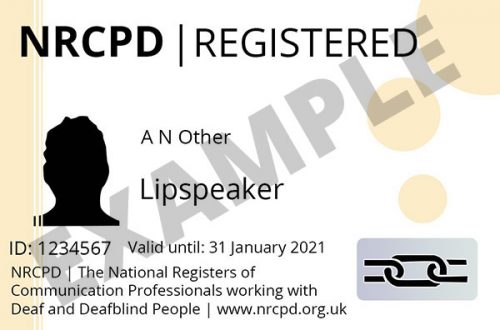
- Deafblind interpreters: for people with dual sensory loss (vision and hearing). They are also regulated by the NRCPD. Their official ID badge is yellow.
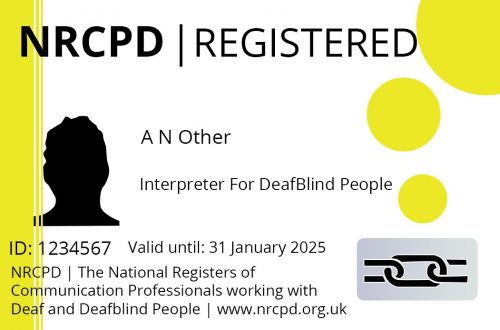
- Speech to text reporter: STTRs help deaf people access audio information via a laptop or large screen. The reporter types a verbatim (word for word) account of what is being said. The information appears on screen in real time for users to read. STTRs are also regulated by the NRCPD. Their official ID badge is blue.
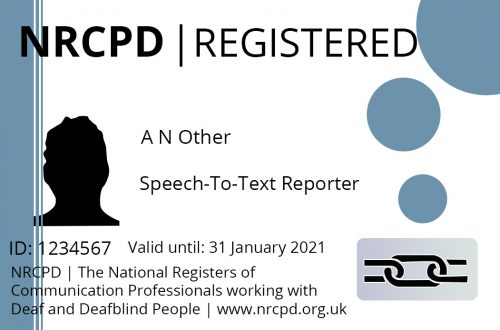
- Electronic notetaker: notetakers produce a set of notes for people who can’t take their own because they are lipreading or watching a sign language interpreter. They are used in work situations such as a meeting, or training courses. Electronic notetakers are also regulated by the NRCPD. Their official ID badge is orange.
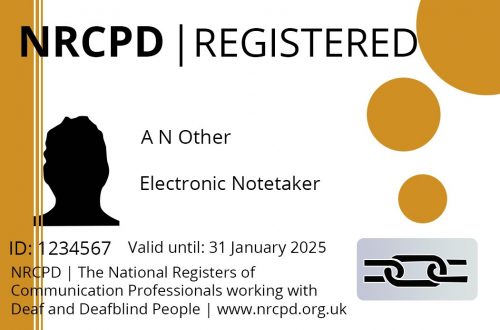
All NRCPD professionals can be searched and booked via the NRCPD website.
Technology support at work
As well as communication support resources, there are also other technologies that can help support your work.
Smoke alarms
It is important your workplace makes sure their fire evacuation policies are accessible. There are smoke alarm systems that use alternative sensory alerts. These can include flashing lights, vibrating pads and vibrating pagers. If your workplace has not made you aware of their accessible policy – do raise it yourself. It is important you remain safe.
Speech to text smartphone apps
There are now a variety of apps that can convert speech to text on your smartphone. It is worth asking friends, or doing some research to find one that works on your device and fits your needs. RNID has some useful information about STT apps on their website. It is worth bearing in mind that these apps are currently unregulated. Therefore they may be more appropriate for personal use, rather than in the workplace.
Video conferencing accessibility features
Popular video conferencing apps (such as Zoom, Microsoft Teams and Google Meet) all have accessibility features. These include things like:
- Automated captioning
- Creating a transcript
- ‘Pinning’ the interpreter so they can always be seen
- Recording the meeting including captions and interpretation
It may be worth familiarising yourself with these on your company’s chosen software. You could also make sure anyone running a meeting is aware of them too.
Connecting your hearing aid
If you wear a hearing aid, you can connect it to different inputs to help aid for. For example, you can connect your hearing aid to:
- Your mobile phone, for phone calls and other audio.
- A loop system to help you pick up speech sounds better, if there is one present.
- Some video conferencing apps.
Making phone calls
You can use the following services to help you make phone calls:
- Relay UK – Relay UK can connect you to a relay assistant to make a phone call. The relay assistant types what the caller is saying so you can read their responses. They also read your written responses to the caller. It’s free to use the Relay UK service. You will only pay your normal charges for any calls you make.
- Video relay service – if you use BSL, there are various Video Relay services that connect you to a live BSL interpreter. Some companies, including the Access to Work scheme, have these as a contact option. For other calls, you may need to pay for this service. If you are using this for work, you may be able to cover the costs with your Access to Work.
Technology is always developing, so keep an eye out for new features. However, also bear in mind that some of the newest features are unregulated. You may need more regulated support at work.
We hope this has been useful to help understand what resources are available to support you at work.
Other Resources
Previous resource: In work: using Access to Work – British Sign Language Guide
Next resource: Access to work – British Sign Language Guide


